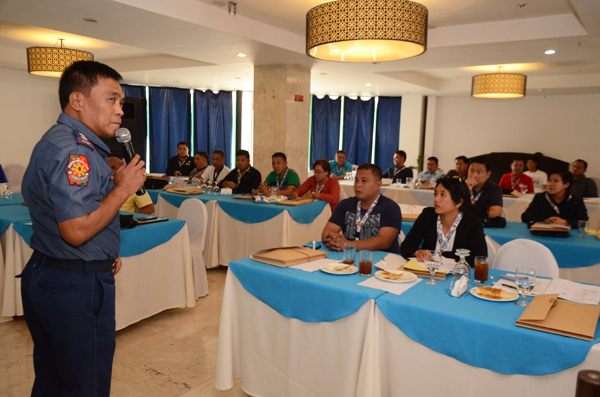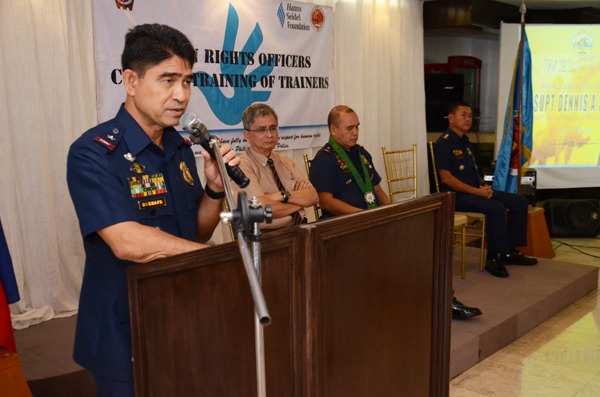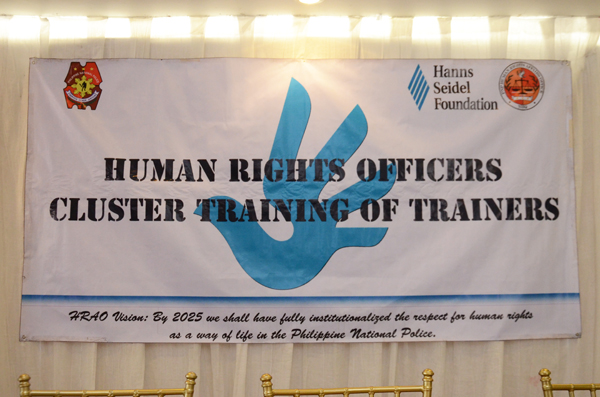On Rights-based Policing
PNP holds rights-based policing forum for CSO Representatives and Training for PNP Human Rights Officers

HSF
Under its partnership with the Hanns Seidel Foundation, the PNP - Human Rights Affairs Office (PNP-HRAO) conducted the "Joint PNP-Civil Society Organizations (CSOs) Forum on Rights-based Policing for PNP and CSO representatives covering the Southern Tagalog and Bicol Regions.
The PNP-HRAO conducted the activity which had a commissioned officer from the PNP Regional Office providing a general discussion on police operational procedures (POPs) with emphasis on those which, if not followed, result to the most number of human rights violations, such as patrol procedures, checkpoints, and arrest procedures. The intent is to provide both police officers and CSO representatives a common understanding of the police officers’ POPs, how these relate to the officers’ practicing rights-based policing, and how the PNP officers and CSOs can work together locally to promote the respect for human rights.

HSF
During the conduct of the open forum, CSO representatives and other participants asked questions and were provided guidance and clarification as these relate to police operational procedures, and current security protocols such as: Conduct of warrantless arrests and how these were perceived by vulnerable groups and other minorities; Protocols in the filing of cases and the rights of accused persons; and Conduct of investigation and the rights of persons under investigation. Also invited to the forum was the Regional Director of the Commission on Human Rights of the Philippines (CHRP) Attorney Arlene Q. Alangco who explained the role and mandate of the CHRP and helped resolve some of the issues and problems discussed.
Prior to holding the forum, the PNP-HRAO with HSF support, conducted a two-day Training of Trainors (ToT) on Rights-Based Policing (RBP) for 29 police region-, province-, and city-based human rights officers from the Southern Tagalog and Bicol Regions to enhance their knowledge of rights-based policing and incorporate these in mission planning, conduct of training and operational activities, and at all times being sensitive to the economic, socio-cultural and political issues in the local areas of responsibility.
Aside from a review of HRBP concepts and application, the training focused on: incorporation of HRBP principles in local police operations including civil disturbance management, and responding to the media; conduct of further training for other PNP human rights officers with emphasis on adherence to laws and police operational procedures; and use of verbal, non-verbal and e-based communication and networking skills.

HSF
In the course of the training, Police Regional Director (for the Bicol Region) CSupt Melvin Buenafe emphasized the need to integrate “rights-based policing” in all aspects of police operations.
The importance of Rights-Based Policing principles was also echoed by Police Inspector Errol Frejas, Platoon Leader of the CALABAR Regional Public Safety Battalion, especially as these relate to conduct of civil disturbance management. He also took note of the widespread use of cellular phone cameras and use of social media in disseminating perceived lapses/human rights violations in the conduct of police operations.
Elements of police training, i.e. knowledge of the legal basis for police action, possession of practical skills, and ability to communicate with the community/perpetrator/victim/etc., were also discussed by the HSF program officer.
Towards the end of the training, participants were required to give technical presentations and the manner by which they delivered their presentations was evaluated by the training team. The training program required that as a condition for each participant to receive the corresponding certificate of completion, the PNP-HRAO must be able to first verify that he or she has conducted a follow-on training for at least two hundred (the previous threshold set by PNP-HRAO was 100) police officers based on the prescribed program of instruction the office has developed for this kind of training.
HSF’s partnership with the PNP supports human rights-based policing training for PNP human rights officers and trainers, and the holding of fora for representatives of the PNP and CSOs to introduce the PNP's "Rights-Based Policing Program," which promotes the police officers' competence, professionalism and networking with the community. HSF has been working successfully with the PNP since 2008 for the implementation of the PNP human rights development program and provided technical and funding assistance in the conduct of human rights training, deepening seminars and the publication/production of training and information materials, among others.
